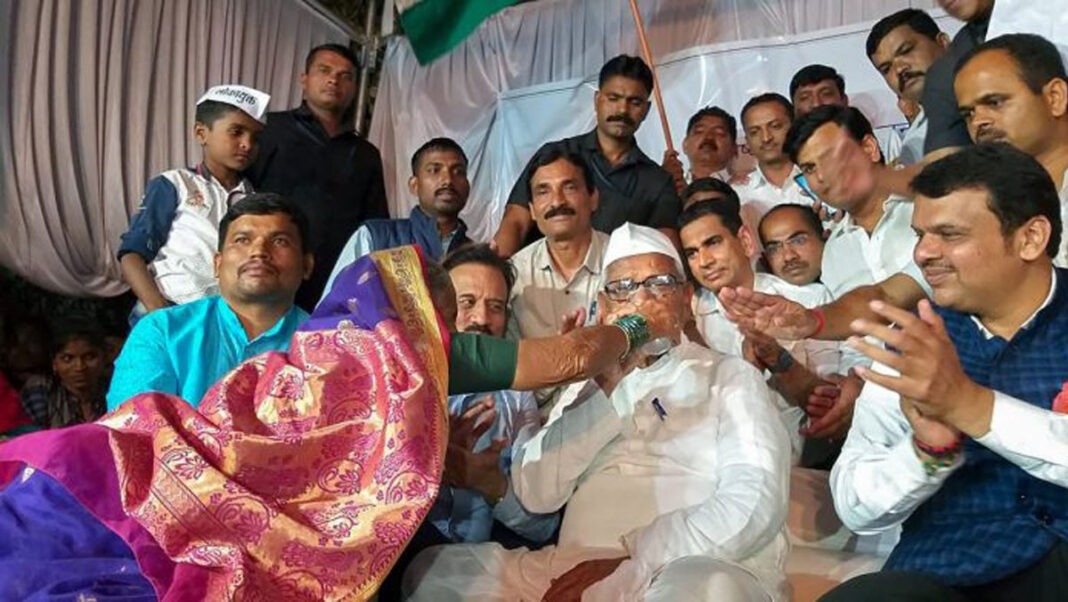INDIA. Mumbai: While Prime Minister Narendra Modi has agreed to interact with farmers agitating against recent farm laws along the Delhi border, on December 25, social reformer Padma Bhushan Anna Hazare has decided to launch a separate agitation for other agrarian reforms.
In a letter dated December 15, 2020, to Union Agriculture Minister Narendra Singh Tomar, Hazare has reminded him about the assurance given to him by former Union Agriculture Minister Radha Mohan Singh on February 05, 2019, to implement the demands raised by him.
Assurance by former minister
Because of Hazare’s hunger strike, Radha Mohan Singh had visited his native place “Ralegan-Siddhi” in Ahmednagar in Western Maharashtra and had assured him to take action on his demands. Former Maharashtra Chief Minister Devendra Fadnavis was also present. Based on the assurance, he had called off his hunger strike, Hazare mentioned in his letter.
Now in his letter to Tomar, Hazare has pointed out the issues agreed upon by the former agriculture minister. They include: to accord quasi-judicial status and autonomy to the Commissionfor Agricultural Costs & Prices (CACP), to fix prices of agriculture produce based on C2+50 formula as per the recommendations of the Swaminathan Committee, to fix Minimum Support Price (MSP) for fruits, vegetables, and milk, to give 80 percent grant for procurement of agriculture equipment used for Drip Irrigation, Sprinkler Irrigation, etc and to set up a high powered committee led by the Union Minister of State for Agriculture to look into farmers’ woes in general.
If no immediate action is taken on the assurance given last year, he will be left with no alternative but to undertake fast in New Delhi, Hazare has said. The sources in Hazare’s office told the “Transcontinental Times” that he has already approached the Delhi administration seeking permission to hold agitation either at Jantar Mantar or Ram Leela Maidan.
Hazare refuses to join ongoing stir
In another development, an 11 member delegation of agitating farmers, called on Hazare in Ralegan Siddhi on Sunday and urged him to join the ongoing stir against three farm laws. However, 83-year-old Hazare told them that although he supports the stir, he will not be able to join it given the severe cold and his weak health. Besides he is planning for a separate agitation on farmers’ issues at later date.
While the stalemate continues, the farmers are planning a 24-hour long agitation on Monday (December 21). They have also appealed to people to undertake a day-long fast on December 23 (Farmers’ Day). Besides, they have also decided to stop the collection of toll from December 25 to December 27 on National Highway in Haryana.
Appeal by economists
In the meanwhile, ten economists in the country have urged the Government to repeal the controversial farm laws. In a letter to Tomar, these 10 economists have said while they believe that improvements and changes are required in the agricultural marketing system for the benefit of millions of small farmers, the reforms brought by three farm acts are based on wrong assumptions. The claims that the farmers are unable to get remunerative prices and have no freedom to sell their produce wherever they like are not in their interest, the economists said.
These farm laws seek to undermine the role of the state governments in regulating agriculture markets when over 20 states have amended their Agricultural Produce Market Committee (APMC) Acts to allow private mandis, e-trading, e NAM, etc. Besides the existing mandis and the proposed private (unregulated) mandis, will have two different sets of rules. If collusion and market manipulation are concerns inside the APMC markets, the same collusion and market manipulation are likely to continue in the unregulated market space. Within the regulated APMC markets, there exist mechanisms to address and prevent such market manipulation, whereas in the unregulated ‘trade areas’, the central Act contemplates no such mechanisms,” they have said.
The APMC market yards still set the benchmark prices through the daily auctions and offer some reliable price signals to the farmers. Without these price signals, the fragmented markets could pave the way for local monopolies. The experience in Bihar since the removal of its APMC Act in 2006 shows that farmers have less choice of buyers and less bargaining power, resulting in significantly lower prices compared to other states.
Read also: Protests Erupt Across India As President Passes Farmers’ Bill
The economists have also raised the issue of the huge asymmetry between small farmers and companies, in the Contract Farming law, which is not addressed to provide adequate protection to the farmers. Besides, concern about domination by big agri-businesses is also worrisome, they have said.
Ten economists
The signatories to the letter addressed to Tomar are: D Narsimha Reddy(former Dean, School of Social Sciences, University of Hyderabad), Kamal Nayan Kabra( Professor of Economics (1980-2003), Indian Institute of Public Administration, New Delhi), K N Harilal( Member, Kerala State Planning Board, Government of Kerala and an Associate Fellow in the Centre for Development Studies), Ranjit Singh Ghuman (Professor of Eminence, Punjab School of Economics), Surinder Kumar (Vice President, Indian Society of Labour Economics, New Delhi), Arun Kumar (the Malcolm S Adiseshiah Chair Professor at Institute of Social Sciences, N Delhi), Rajinder Chaudhary (Professor at Department of Economics, M D University, Rohtak, Haryana), Prof. R Ramakumar (Dean of School of Development Studies and NABARD Chair Professor, Centre for Study of Developing Economics, Tata Institute of Social Sciences, Mumbai), Vikas Rawal(Professor of Economics, Jawaharlal Nehru University, New Delhi) and Dr. Himanshu (Associate Professor Centre for Economic Studies and Planning, JNU, New Delhi).




Comments are closed.